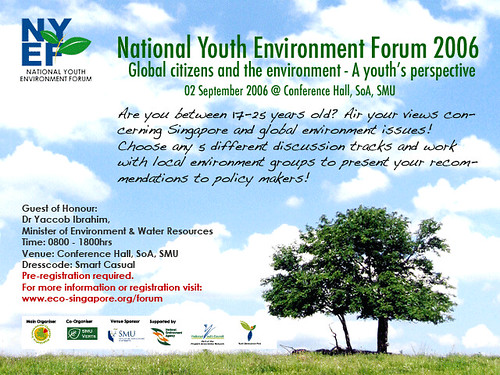"Global Citizens and the Environment:
A Youth Perspective"
Date: 2nd September 2006
Time: 8.30am- 3.30pm
Venue: Singapore Management University,
School of Accounting Auditorium
Guest of Honour: Dr Yaacob Ibrahim, Minister for the Environment and Water Resources
Registeration is free.
Sign up at: http://www.eco-singapore.org/forum/
ECO (Singapore) and the SMU Verts will be organising the National Youth
Environmental Forum 2006.
As part of the national strategy in raising awareness in youths on environmental matters, ECO Singapore will be organising the National Youth Environment Forum 2006 together with SMU Verts.
The inaugural National Youth Environmental Forum (NYEF) provides an interactive platform for youth age from 17 - 25 years old to discuss and engage in global and local environmental issues and policies.
Focus will be on the realities of sustainable living, with the intention of encouraging youths of today to begin leading greener lifestyles today for a sustainable tomorrow and to challenge youth to rethink existing policies on environmental issues.
The forum also provides a platform for Non-Government Organisations (NGOs) to showcase their existing initiatives.
The topics for discussion includes:Energy and Climate Change Biodiversity and Nature Conservation Sanitation and Water Pollution and Ecosystem Management Poverty and Population

There is also a pre-forum seminar for the Biodiversity and Nature Conservation discussion group titled:
"What happened at Chek Jawa?"
Date: Saturday, 26th August 2006
Time: 9am - 11am
Venue: Lecture Theatre 25
Faculty of Science
National University of Singapore
See map at http://map.rafflesmuseum.net/
The program for the pre-forum seminar is as follows:
1.“What happened at Chek Jawa.” An overview – N. Sivasothi
The events surrounding Chek Jawa mark a significant milestone in nature conservation and spontaneous consultation between the public and thegovernment of Singapore. Many individuals and groups came forward to participate in the discovery, study, public education and feedback exercises during this time. This overview highlights some but not all, of the main efforts and elements that contributed to the deferment of reclamation there and comments on volunteer management lessons from that experience.
2. “How we shared Chek Jawa” - Ria Tan
Ria was heartbroken when she first saw Chek Jawa about six months before it was due to be reclaimed. Already a volunteer guide at Sungei Buloh, she decided to bring as many people as she could to see Chek Jawa before it was gone forever. Friends, family, total strangers, people who happened to be hanging around Ubin jetty. Anyone was fair game! She joined the Raffles Museum’s Public Education Walk effort as an executor, organising the logistics for the walks, working on the Chek Jawa website, managed registrations, uploaded her photo galleries and organised a roving public
exhibition of photos of Chek Jawa. She also supported other efforts, including Joseph Lai's transect. It was a huge surprise to her when reclamation was deferred! Ria learnt from this experience, the importance of guiding and a personal introduction to the habitat. She also realised the power of the internet in raising awareness. It is only when people feel something for the habitat that they will feel moved to do something for it.
3. “From research to education” – N. Sivasothi
Staff and volunteers of the Raffles Museum are amongst the last to see many sites in Singapore which has seen a long history of development of coastal sites since the time of the British. The function and importance of a museum’s work in salvage surveys is explained and why an island called Pulau Seringat led to the large scale public education exercise at Chek Jawa.
4. “Answering the call” - Zeehan Jaafar
Recruited to help with the salvage operation at Chek Jawa, my task was to collect fishes using a beach seine net, a method I frequently use to study coastal fishes. It was surprising that the waters at Chek Jawa were very rich indeed, and unlike no other site in Singapore. With the closure of Chek Jawa approaching, I was one of the marine guides who shared stories about marine life with the public. It was heartening to see Singaporeans genuinely interested in our natural history and the encouragement they gave to their children as well. In 2004, I co-led a team of 60 volunteers for the Chek Jawa Transect 2004 and now participate in the annual coastal clean-up of the
mangroves there.
5. “Chronicles of Chek Jawa” - Chua Ee Kiam
Ee Kiam was fascinated by Chek Jawa the moment he set foot on the site. He photographed it tirelessly but with time running out, he brought individuals to Chek Jawa to help them discover a jewel in Singapore’s midst. He was featured in a ChannelNewsAsia broadcast about the site, talking about the importance for Singaporeans to get to know their land and heritage. He worked hard at a book about Chek Jawa, thinking it to be an eulogy, but with news of the deferment of reclamation there, it turned into a celebration! Special about this book was a partnership with students of Tanjong Katong Secondary School, with help from the Raffles Museum, to celebrate the launch of the book
6. “A partnership with stakeholders” - Wong Tuan Wah.
Wong Tuan Wah watched the events fold at Chek Jawa unfold perhaps with some disbelief. The National Parks Board provides scientific input to government decision about nature sites and in this case, he was witnessing a growing possibility of deferment of reclamation at Chek Jawa. He has since been discussed the process with other senior civil servants and also chairs the Chek Jawa Working Group which provides news and receives feedback from stakeholders. He will share how NParks has balanced public’s interest and impact at Chek Jawa and how development there is being handled.
7. "A partnership with stakeholders" - Wong Tuan Wah.
Wong Tuan Wah watched the events fold at Chek Jawa unfold perhaps with some disbelief. The National Parks Board provides scientific input to government decision about nature sites and in this case, he was witnessing a growing possibility of deferment of reclamation at Chek Jawa. He has since discussed the process with other senior civil servants and also chairs the Chek Jawa
Working Group which provides news and receives feedback from stakeholders. He will share how NParks has balanced public's interest and impact at Chek Jawa and how development there is being handled.
8. Final Words - Leo Tan
Leo Tan watched the events of Chek Jawa unfold, compared it against previous experiences and offered words of wisdom and experience to those who came to seek it out. He has a holitic prespective of the issues and able to put things into perspective. He has always encouraged young people, whether marine biologists, teachers or naturalists and will provide a personal and holistic reflection of the morning's proceedings.

 I can be contacted at
I can be contacted at 







No comments:
Post a Comment